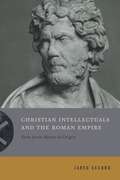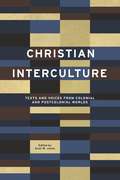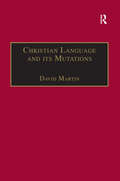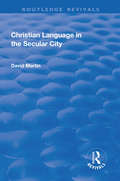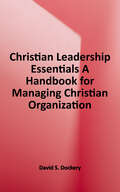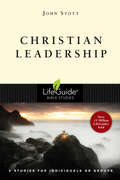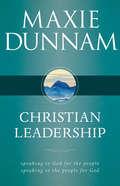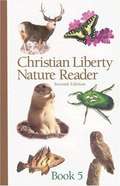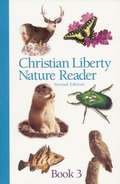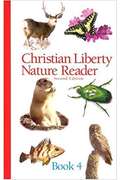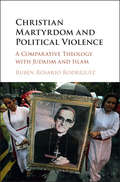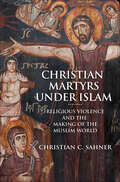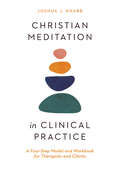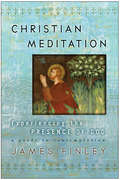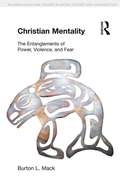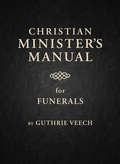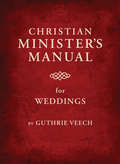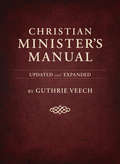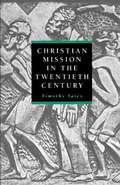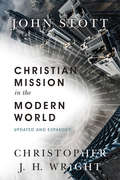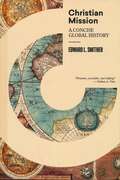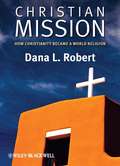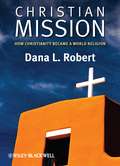- Table View
- List View
Christian Intellectuals and the Roman Empire: From Justin Martyr to Origen (Inventing Christianity)
by Jared SecordEarly in the third century, a small group of Greek Christians began to gain prominence and legitimacy as intellectuals in the Roman Empire. Examining the relationship that these thinkers had with the broader Roman intelligentsia, Jared Secord contends that the success of Christian intellectualism during this period had very little to do with Christianity itself.With the recognition that Christian authors were deeply engaged with the norms and realities of Roman intellectual culture, Secord examines the thought of a succession of Christian literati that includes Justin Martyr, Tatian, Julius Africanus, and Origen, comparing each to a diverse selection of his non-Christian contemporaries. Reassessing Justin’s apologetic works, Secord reveals Christian views on martyrdom to be less distinctive than previously believed. He shows that Tatian’s views on Greek culture informed his reception by Christians as a heretic. Finally, he suggests that the successes experienced by Africanus and Origen in the third century emerged as consequences not of any change in attitude toward Christianity by imperial authorities but of a larger shift in intellectual culture and imperial policies under the Severan dynasty. Original and erudite, this volume demonstrates how distorting the myopic focus on Christianity as a religion has been in previous attempts to explain the growth and success of the Christian movement. It will stimulate new research in the study of early Christianity, classical studies, and Roman history.
Christian Interculture: Texts and Voices from Colonial and Postcolonial Worlds (World Christianity #3)
by Arun W. JonesDespite the remarkable growth of Christianity in Africa, Asia, and Latin America in the twentieth century, there is a dearth of primary material produced by these Christians. This volume explores the problem of writing the history of indigenous Christian communities in the Global South.Many such indigenous Christian groups pass along knowledge orally, and colonial forces have often not deemed their ideas and activities worth preserving. In some instances, documentation from these communities has been destroyed by people or nature. Highlighting the creative solutions that historians have found to this problem, the essays in this volume detail the strategies employed in discerning the perspectives, ideas, activities, motives, and agency of indigenous Christians. The contributors approach the problem on a case-by-case basis, acknowledging the impact of diverse geographical, cultural, political, and ecclesiastical factors.This volume will inspire historians of World Christianity to critically interrogate—and imaginatively use—existing Western and indigenous documentary material in writing the history of Christianity in Asia, Africa, the Americas, and Oceania.In addition to the editor, the contributors to this volume include J. J. Carney, Adrian Hermann, Paul Kollman, Kenneth Mills, Esther Mombo, Mrinalini Sebastian, Christopher Vecsey, Haruko Nawata Ward, and Yanna Yannakakis.
Christian Interculture: Texts and Voices from Colonial and Postcolonial Worlds (World Christianity)
by Arun W. JonesDespite the remarkable growth of Christianity in Africa, Asia, and Latin America in the twentieth century, there is a dearth of primary material produced by these Christians. This volume explores the problem of writing the history of indigenous Christian communities in the Global South.Many such indigenous Christian groups pass along knowledge orally, and colonial forces have often not deemed their ideas and activities worth preserving. In some instances, documentation from these communities has been destroyed by people or nature. Highlighting the creative solutions that historians have found to this problem, the essays in this volume detail the strategies employed in discerning the perspectives, ideas, activities, motives, and agency of indigenous Christians. The contributors approach the problem on a case-by-case basis, acknowledging the impact of diverse geographical, cultural, political, and ecclesiastical factors.This volume will inspire historians of World Christianity to critically interrogate—and imaginatively use—existing Western and indigenous documentary material in writing the history of Christianity in Asia, Africa, the Americas, and Oceania.In addition to the editor, the contributors to this volume include J. J. Carney, Adrian Hermann, Paul Kollman, Kenneth Mills, Esther Mombo, Mrinalini Sebastian, Christopher Vecsey, Haruko Nawata Ward, and Yanna Yannakakis.
Christian Language and its Mutations: Essays in Sociological Understanding (Theology and Religion in Interdisciplinary Perspective Series)
by David MartinChristian Language and its Mutations explores how Christian language alters in various social, cultural, historical and religious contexts. Having delineated the core language of Christianity, David Martin analyses how it mutates in different historical and social contexts, notably: peace and war; the arts - particularly painting and music; the sacred space (the city) and the sacred text (the liturgy); education; and the global situation of Christianity and contemporary secular society - evangelicalism, rational religion, Pentecostalism and Base Communities. Presenting a unique perspective to show how and why Christianity alters according to context, this book will prove insightful and accessible to students, clergy and general readers alike. David Martin is Honorary Professor in the Department of Religious Studies, Lancaster University, and Emeritus Professor of Sociology at the London School of Economics, UK. He is the author of some two dozen books, including many landmark titles in the sociology of religion.
Christian Language in the Secular City (Routledge Revivals)
by David MartinThis title was first published in 2002.Christian Language in the Secular City offers a series of meditations by the internationally renowned sociologist, David Martin. Martin presents a distinctive angle of vision on key issues of Christian faith, dividing the book into three clear sections: the Liturgical Year; the Christian agenda, including prophecy, justification, sacred places and spaces, wisdom, providence, peace and war, angelic and demonic; and Emergent Occasions such as the fall of the Berlin Wall, the 900th anniversary of Winchester Cathedral, commemoration of poets and of martyrs, and more. With its uniquely lyrical presentation, David Martin's book transposes central issues of theology and Christian faith into a new key. This work complements David Martin's theoretical book focusing on Christian Language and its Mutations, published in Ashgate's Religion and Theology in Interdisciplinary Perspective series. David Martin is Honorary Professor in the Department of Religious Studies, Lancaster University, and Emeritus Professor of Sociology at the London School of Economics, UK. He is the author of some two dozen books, including Divinity in a Grain of Bread, and many landmark titles in the sociology of religion.
Christian Law
by Norman DoeChristian Law: Contemporary Principles offers a detailed comparison of the laws of churches across ten distinct Christian traditions worldwide: Catholic, Orthodox, Anglican, Lutheran, Methodist, Reformed, Presbyterian, United, Congregational and Baptist. From this comparison, Professor Doe proposes that all denominations of the faith share common principles in spite of their doctrinal divisions; and that these principles reveal a concept of 'Christian law' and contribute to a theological understanding of global Christian identity. Adopting a unique interdisciplinary approach, the book provides comprehensive coverage on the sources and purposes of church law, the faithful (lay and ordained), the institutions of church governance, discipline and dispute resolution, doctrine and worship, the rites of passage, ecumenism, property and finance, as well as church, state and society. This is an invaluable resource for lawyers and theologians who are engaged in ecumenical and interfaith dialogue, showing how dogmas may divide but laws link Christians across traditions.
Christian Leadership Essentials: A Handbook for Managing Christian Organization
by David S. DockeryThis book finds university president David S. Dockery assembling a great wealth of tried and true insights on the distinctive methods of leading Christian organizations and institutions. No matter how much experience a faith-based leader may already have, there are plenty of fresh thoughts and indispensable guiding principles here on topics including finance and budget planning, mission and vision, employee relations, theological foundations, mentoring, crisis management, and more. A majority of the nineteen contributors are active academic presidents, including Robert B. Sloan (Houston Baptist University; "A Biblical Model of Leadership"), Judson Carlberg (Gordon College; "Managing the Organization"), Jon Wallace (Azusa Pacific University; "Financial Oversight and Budget Planning"), Evans Whitaker (Anderson University [South Carolina]; "Development, Campaigns, and Building Projects"), Carl Zylstra (Dordt College; "Accreditation and Government Relations"), Jim Edwards (Anderson University [Indiana]; "Relationships with Multiple and Various Constituencies"), Phil Eaton (Seattle Pacific University; "Employee Relations in a Grace-filled Community"), Barry Corey (Biola University; "Engaging the Culture"), and Randall O'Brien (Carson-Newman College; "The Leader as Mentor and Pastor").
Christian Leadership: Biblical Models Of Church, Gospel And Ministry (LifeGuide Bible Studies)
by John StottThe most influential leader in the early church was undoubtedly the apostle Paul. He never lost the vision of God's single new humanity���Jews and Gentiles together. And in his letters we watch him exercising his leadership skills among the early Christians. This nine-session LifeGuide Bible Study by John Stott is based on his book Basic Christian Leadership and covers the first four chapters of 1 Corinthians, in which Paul responds to a complex church situation and to questions the Corinthians have addressed to him. He does so with clarity, wisdom, humility, love and gentleness���qualities that we can learn from as leaders today. For over three decades LifeGuide Bible Studies have provided solid biblical content and raised thought-provoking questions���making for a one-of-a-kind Bible study experience for individuals and groups. This series has more than 130 titles on Old and New Testament books, character studies, and topical studies.
Christian Leadership: Speaking to God for the people, speaking to God for the people
by Maxie DunnamThe bedrock grounding of church leaders is in God. This grounding comes through deliberate and explicit attention to God through prayer and self-reflection. Leadership as vocation, Christian leadership, begins with self-leadership, clarifying one's own heart, one's whole being, and one's mind in order to find and show that one's most basic identity and deepest and most concrete security lie in God—not in success or in pleasing someone else or in being seen as a good person or being loved by a congregation or the faith community we lead. Contents includes: The Vocation of Leadership The Shape of Our Vocation Lessons From the Saints What is Good Ministry? The Persons We Are and the Institutions We Serve The Preacher and Preaching Taking Care of Ourselves in the Everyday Time: It's Ours to Receive, Use, and Manage Staying Alive All Our Ministry Life
Christian Liberty Nature Reader (Book Five)
by Worthington Hooker Michael J. McHughThis particular textbook is designed not only to improve a student's reading skills and comprehension, but also to increase the student's understanding of and interest in God's wonderful creation.
Christian Liberty Nature Reader Book Three
by Julia Mcnair Wright Edward J. ShewanThis reader exposes students to the daily routine of various animals. Review questions are provided in the text to help instructors evaluate the comprehension level of each reader.
Christian Liberty Nature Reader: Book 4
by Michael McHughThis fascinating text provides supplemental reading for students interested in learning more about animals. Numerous illustrations and helpful chapter comprehension questions are included with this reader. (Christian Liberty Press) Grade: 4th
Christian Martyrdom and Political Violence: A Comparative Theology with Judaism and Islam
by Rubén Rosario RodríguezIn recent years, martyrdom and political violence have been conflated in the public imagination. Rubén Rosario Rodríguez argues that martyr narratives deserve consideration as resources for resisting political violence in contemporary theological reflection. Underlying the three Abrahamic monotheistic traditions is a shared belief that God requires liberation for the oppressed, justice for the victims and, most demanding of all, love for the political enemy. Christian, Jewish and Muslim martyr narratives that condone political violence - whether terrorist or state-sponsored - are examined alongside each religion's canon, in order to evaluate how central or marginalized these discourses are within their respective traditions. Primarily a work of Christian theology in conversation with Judaism and Islam, this book aims to model religious pluralism and cooperation by retrieving distinctly Christian sources that nurture tolerance and facilitate coexistence, while respecting religious difference. Examines the foundational scriptures of Christianity, Judaism and Islam to reveal what they have in common, facilitating discussion of controversial and divisive issues among the three Abrahamic religions. Engages in a 'theological' reading of martyrdom in all three Abrahamic traditions to encourage public and interreligious dialogue from a confessional point of view, a much-needed corrective to the dominant discourse in the media that ignores or marginalizes religious perspectives. Through engaging the contributions of Latin American liberation theology - specifically God's preferential option for the poor and oppressed - this work defends a Christian biblical theological perspective that has profound parallels with Judaism and Islam, and should facilitate interfaith dialogue on political violence.
Christian Martyrs under Islam: Religious Violence and the Making of the Muslim World
by Christian C. SahnerA look at the developing conflicts in Christian-Muslim relations during late antiquity and the early Islamic eraHow did the medieval Middle East transform from a majority-Christian world to a majority-Muslim world, and what role did violence play in this process? Christian Martyrs under Islam explains how Christians across the early Islamic caliphate slowly converted to the faith of the Arab conquerors and how small groups of individuals rejected this faith through dramatic acts of resistance, including apostasy and blasphemy.Using previously untapped sources in a range of Middle Eastern languages, Christian Sahner introduces an unknown group of martyrs who were executed at the hands of Muslim officials between the seventh and ninth centuries CE. Found in places as diverse as Syria, Spain, Egypt, and Armenia, they include an alleged descendant of Muhammad who converted to Christianity, high-ranking Christian secretaries of the Muslim state who viciously insulted the Prophet, and the children of mixed marriages between Muslims and Christians. Sahner argues that Christians never experienced systematic persecution under the early caliphs, and indeed, they remained the largest portion of the population in the greater Middle East for centuries after the Arab conquest. Still, episodes of ferocious violence contributed to the spread of Islam within Christian societies, and memories of this bloodshed played a key role in shaping Christian identity in the new Islamic empire.Christian Martyrs under Islam examines how violence against Christians ended the age of porous religious boundaries and laid the foundations for more antagonistic Muslim-Christian relations in the centuries to come.
Christian Meditation in Clinical Practice: A Four-Step Model and Workbook for Therapists and Clients (Christian Association for Psychological Studies Books)
by Joshua J. Knabban introduction to the rich resources on meditation from eight major streams of the Christian traditionpractices from the early desert Christians, Ignatius of Loyola, Celtic Christians, the Puritans, contemporary writers, and many othersguidance for targeting transdiagnostic processes—patterns of cognition, affect, behavior, the self, and relationships that may lead to psychological sufferingresearch-based evidence for the benefits of Christian meditationclient-friendly tools for practicing meditation, including step-by-step instructions, worksheets, journaling prompts, and links to tailored audio resources
Christian Meditation: Experiencing the Presence of God
by James FinleyEnter a Monastery Without Walls Christian Meditation introduces an ancient practice to a contemporary audience. James Finley, a former monk and student of Thomas Merton, presents the fundamentals of both understanding and practicing Christian meditation. He provides simple, helpful instructions, as well as explaining the deeper connection with the divine that meditation can bring. Above all, he makes clear that the aim of meditation is to allow us to experience divine contemplation -- the presence of God.
Christian Mentality: The Entanglements of Power, Violence and Fear (Religion in Culture)
by Burton L. MackThe Christian myth is entangled with American politics, with the nation's image of its own manifest destiny. 'Christian Mentality' analyses the myths that have shaped America's collective mentality. Concepts that are taken for granted in the formation of American policy - namely power, violence and fear - are examined. The book argues that America must find an image for itself which more truly reflects its reality as a polycultural nation still struggling for social democracy. 'Christian Mentality' will be invaluable to students and scholars interested in the impact of religion on political thought.
Christian Minister's Manual for Funerals
by Guthrie VeechUpdated and expanded with 32 pages of additional content designed to meet the growing demands of busy ministers, the Christian Minister's Manual is an essential tool for ministers. This deluxe edition includes a CD-ROM that contains full searchable content of the Christian Minister's Manual. Customizable templates for sermon building, orders of worship, programs, questionnaires, forms, and other resources are available in MS Word and rich text format to help meet the individual needs of each congregation. This essential tool for ministers features Scripture readings, sermons, outlines, and practical tips for • Worship services • Weddings • Funerals • Ordinations • Communion meditations • Baptisms • Dedications • Hospital visitation • Evangelism • and much more!
Christian Minister's Manual for Weddings
by Guthrie VeechUpdated and expanded with 32 pages of additional content designed to meet the growing demands of busy ministers, the Christian Minister's Manual is an essential tool for ministers. This deluxe edition includes a CD-ROM that contains full searchable content of the Christian Minister's Manual. Customizable templates for sermon building, orders of worship, programs, questionnaires, forms, and other resources are available in MS Word and rich text format to help meet the individual needs of each congregation. This essential tool for ministers features Scripture readings, sermons, outlines, and practical tips for • Worship services • Weddings • Funerals • Ordinations • Communion meditations • Baptisms • Dedications • Hospital visitation • Evangelism • and much more!
Christian Minister's Manual—Updated and Expanded Deluxe Edition
by Guthrie VeechUpdated and expanded with 32 pages of additional content designed to meet the growing demands of busy ministers, the Christian Minister's Manual is an essential tool for ministers. This deluxe edition includes a CD-ROM that contains full searchable content of the Christian Minister's Manual. Customizable templates for sermon building, orders of worship, programs, questionnaires, forms, and other resources are available in MS Word and rich text format to help meet the individual needs of each congregation. This essential tool for ministers features Scripture readings, sermons, outlines, and practical tips for • Worship services • Weddings • Funerals • Ordinations • Communion meditations • Baptisms • Dedications • Hospital visitation • Evangelism • and much more!
Christian Mission In The Twentieth Century
by Timothy YatesThis study provides a much-needed historical overview of the main developments in the theory and practice of Christian mission in this century. Part 1 describes the great missionary conferences of Edinburgh 1910, Jerusalem 1928, and Tambaram, Madras 1938, with particular emphasis on Christian responses to Hindu, Muslim, Buddhist and secular interpretations of religious life. In Part 2, the developing pluralism of the modern world is addressed by way of Roman Catholic, Orthodox, and evangelical documents, and through diverse contemporaneous thinkers.
Christian Mission in the Modern World (Ivp Classics Ser.)
by John StottJesus sends us into the world just as the Father sent him. And yet thousands of years later Christians continue to disagree on what this involves. Some believe that the focus of Christian mission is evangelizing and "saving souls." Others emphasize global justice issues or relief and development work. Is either view correct on its own? John Stott's classic book presents an enduring and holistic view of Christian mission that is just as needed today. Newly updated and expanded by Christopher J. H. Wright, Christian Mission in the Modern World provides a biblically based approach to mission that addresses both spiritual and physical needs. With his trademark and unparalleled clarity and conviction, Stott illuminates how the Great Commission itself not only assumes the proclamation that makes disciples, but also teaches obedience to the Great Commandment of love and service. Wright has expertly updated the original book and demonstrates the continuing relevance of Stott's prescient thinking. This balanced approach to mission offers timeless guidance for current and future Christians to embrace Jesus' unconflicted and holistic model of ministry.
Christian Mission: A Concise, Global History
by Edward L. Smither2020 Christianity Today Award of Merit for Missions 2020 Outreach Magazine Cross-Cultural and Missional Resource of the Year A deeper understanding of the grand history of mission leads to a faithful expression of God's mission today. From the beginning, God's mission has been carried out by people sent around the world. From Abraham to Jesus, the thread that weaves its way throughout Scripture is a God who sends his people across the world, proclaiming his kingdom. As the world has evolved, the Christian mission continues to be a foundational tradition in the church. In this one-volume textbook, Edward Smither weaves together a comprehensive history of Christian mission, from the apostles to the modern church. In each era, he focuses on the people sent by God to the ends of the earth, while also describing the cultural context they encountered. Smither highlights the continuity and development across thousands of years of global mission.
Christian Mission: How Christianity Became a World Religion
by Dana L. RobertExploring how Christianity became a world religion, this brief history examines Christian missions and their relationship to the current globalization of Christianity. A short and enlightening history of Christian missions: a phenomenon that many say reflects the single most important intercultural movement over a sustained period of human history. Offers a thematic overview that takes into account the political, cultural, social, and theological issues. Discusses the significance of missions to the globalization of Christianity, and broadens our understanding of Christianity as a multicultural world religion. Helps Western audiences understand the meaning of mission as a historical process.
Christian Mission: How Christianity Became a World Religion (Wiley Blackwell Brief Histories of Religion #46)
by Dana L. RobertExploring how Christianity became a world religion, this brief history examines Christian missions and their relationship to the current globalization of Christianity. A short and enlightening history of Christian missions: a phenomenon that many say reflects the single most important intercultural movement over a sustained period of human history Offers a thematic overview that takes into account the political, cultural, social, and theological issues Discusses the significance of missions to the globalization of Christianity, and broadens our understanding of Christianity as a multicultural world religion Helps Western audiences understand the meaning of mission as a historical process Contains several new maps that illustrate demographic shifts in world Christianity
